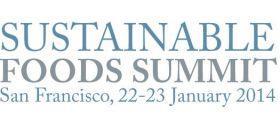
Greater collaboration is required if the American food industry is to meet the challenges of sustainability. This was one of the key findings of the 4th North American edition of the Sustainable Foods Summit organised by Organic Monitor and hosted in San Francisco at the end of January.
Ethical sourcing, biodiversity, the role of sustainability metrics and food ingredients for sustainability were among the key themes debated by more than 160 senior executives during the two-day event.
The importance of collaboration was highlighted by several speakers. In her opening keynote presentation, Theresa Marquez of Organic Valley called for a holistic approach to sustainability. She stated that focusing on measuring impacts led to ‘reductionist thinking’ whereas a more co-operative approach was necessary to change to sustainable food systems.
Jonathan Mayes of US retailer Safeway, which has entered into partnerships with hundreds of farmers to supply sustainable foods for its stores, such partnerships are vital if the retailer is to meet its environmental and social goals. Mayes stated that greater transparency, more collaboration and increased engagement with suppliers was the way forward for Safeway.
Henk Campher of Edelman also highlighted the importance of transparency in the digital age. He called for green brands to take a personalised approach when marketing their products. According to Campher, “social media has given brands the opportunity to communicate directly with consumers in an authentic way. He pointed out that green brands need to be more effective in communicating their sense of purpose.
Labelling of genetically modified foods was another hot topic at the summit. In its paper of GM ingredient labelling, the Non-GMO Project said that about 90 per cent of Americans are in favour of GM labelling. However, high labelling costs are deterring consumers to vote for the measure at the ballot box.
Representing the Just Label It! Campaign, Laura Batcha said she believes American food companies will increasingly opt for voluntary labelling schemes. Whole Foods Market and Ben & Jerry’s have already made GM-free pledges. Over 14,500 products are now certified Non-GMO Project Verified, with retail sales exceeding US$5bn.



